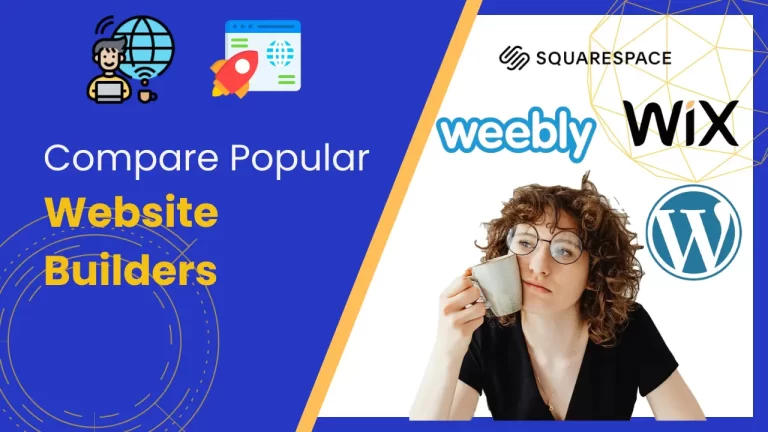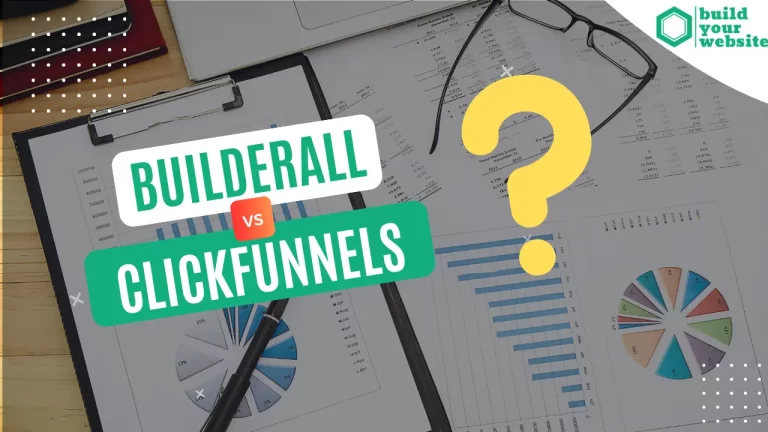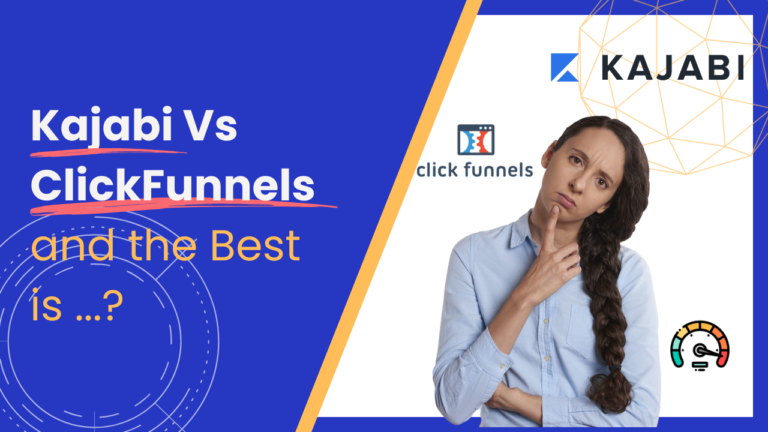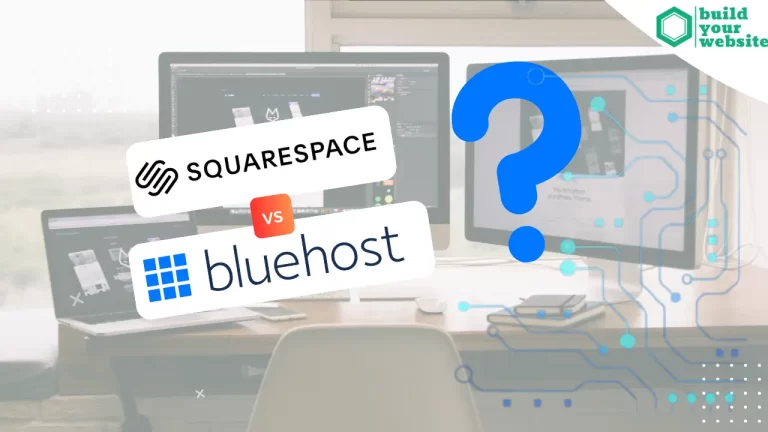Top 5 Best Website Builders (2024 Edition)

Navigating the world of website builders can feel like standing at the crossroads of your online journey. Whether you’re aiming to craft a professional website for your small business, launch an engaging blog, or open an online store, the choice of website builder is pivotal. It hinges not only on web design aesthetics but also on ease of use, pricing, and the rich features that support your vision for website creation. Importantly, the best website builders for you should offer robust customer support, ensuring you’re never left in the lurch, and provide flexibility in terms of data ownership and portability.
As we march into 2024, the landscape of website builders—spanning from Squarespace with its design-centric approach to Shopify, a powerhouse for e-commerce, and Wix, known for its all-rounder capabilities—continues to evolve. Each brings to the table a suite of tools tailored for professional website design, hosting, and seamless integration capabilities that cater to both fledgling businesses and established brands. This article will shed light on the top 5 website builders in this year edition, exploring key offerings like website templates, SEO tools for enhanced visibility, and the ease of website building, to guide your selection process in creating that perfect online presence.
Wix: The All-Rounder with Rich Features
Wix stands out in the crowded field of website builders, offering a blend of ease of use, flexibility, and comprehensive features that cater to both novices and seasoned web designers alike. Here’s a closer look at what makes Wix the all-rounder with rich features:
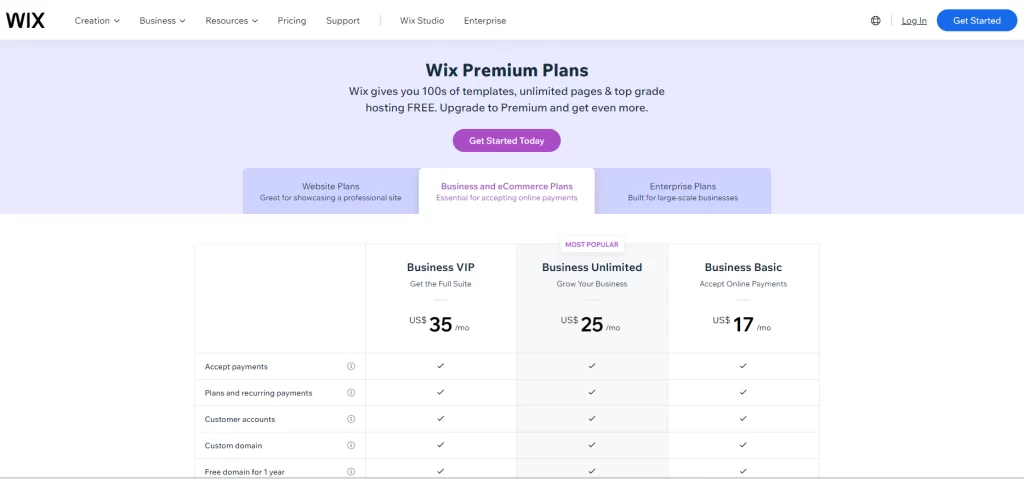
User Experience and Design Flexibility
- Drag-and-Drop Editor: Wix’s intuitive drag-and-drop interface simplifies the process of adding and arranging elements on your website, making web design accessible to everyone.
- Templates and Customization: With over 800 templates available, Wix caters to a wide array of industries and design preferences. Each template is fully customizable, ensuring your website can be as unique as your business.
- Quick Edit Features: Wix’s user-friendly editor includes a quick edit feature, allowing for swift adjustments and easy customization, making it ideal for those who need to make frequent updates to their site.
- Functionality and Support
- Extensive App Market: Wix offers an extensive library of third-party apps and integrations, enabling users to enhance their website’s functionality, from e-commerce tools to marketing widgets.
- E-commerce Platform: For businesses looking to sell online, Wix provides a robust e-commerce platform supporting physical and digital products, services, dropshipping, and print-on-demand products.
- Dedicated Support: A dedicated support team, along with extensive resources like help centers, community forums, and video tutorials, ensures users can find help whenever they need it.
Technical Aspects and Pricing
- Compatibility with Major Frameworks: Wix is compatible with leading frameworks such as JAX, PyTorch, and TensorFlow through Keras 3.0, offering advanced options for users with specific technical requirements.
- Pricing Plans: Wix’s pricing structure is designed to accommodate a range of needs, from a free plan for those just starting out, to more advanced plans starting at $16 per month for professional websites.
- AI and SEO Tools: An AI-fueled automatic website creator simplifies the process of website design, while built-in SEO tools and mobile optimization help ensure your site reaches its target audience effectively.
In essence, Wix combines a user-friendly approach with powerful features and dedicated support, making it a top choice for individuals and businesses looking to establish a professional online presence.
Hostinger: Best Value for Marketing Integration
Hostinger emerges as a standout choice for those prioritizing marketing integration in their website creation, offering a blend of simplicity and advanced tools that cater to both newcomers and seasoned web designers. Here’s a deep dive into what sets Hostinger apart:
Ease of Use and Design Flexibility:
- Drag-and-Drop Editor & Mobile Editing: Hostinger simplifies the web design process with its intuitive drag-and-drop editor, ensuring that even beginners can create stunning websites. Additionally, the mobile editor feature allows for on-the-go website edits directly from smartphones, making website management more accessible than ever.
- AI-Powered Design Tools: With AI at its core, Hostinger offers a unique approach to website design. The AI builder can generate a complete website design based on user prompts, complemented by other AI tools such as a Logo Maker, AI Writer, and AI Heatmap for an all-encompassing design experience.
Marketing Integration and Performance:
- Comprehensive Marketing Tools: Despite its lack of third-party integrations, Hostinger compensates with a robust suite of marketing tools. Integration with Google Analytics, Google Tag Manager, and various social media pixels like Facebook and WhatsApp Live Chat ensures that your website is not only well-designed but also primed for engagement and conversion.
- Server Performance and Uptime: The backbone of any successful website is its performance and reliability. Hostinger’s servers boast an impressive average uptime of 99.933% over the last six months, ensuring that your website remains accessible to your audience around the clock.
Affordability and Support:
- Pricing: Starting at just $2.69/month, Hostinger is one of the most affordable website builders on the market. For those looking for an even better deal, the special coupon code “BPHWB48” reduces the price to $2.24/month for the premium website builder plan, offering incredible value for money.
- Customer Support: Recognizing the importance of timely assistance, Hostinger provides 24/7 live support. Whether you’re facing a technical challenge or need guidance on website design, help is always just a click away.
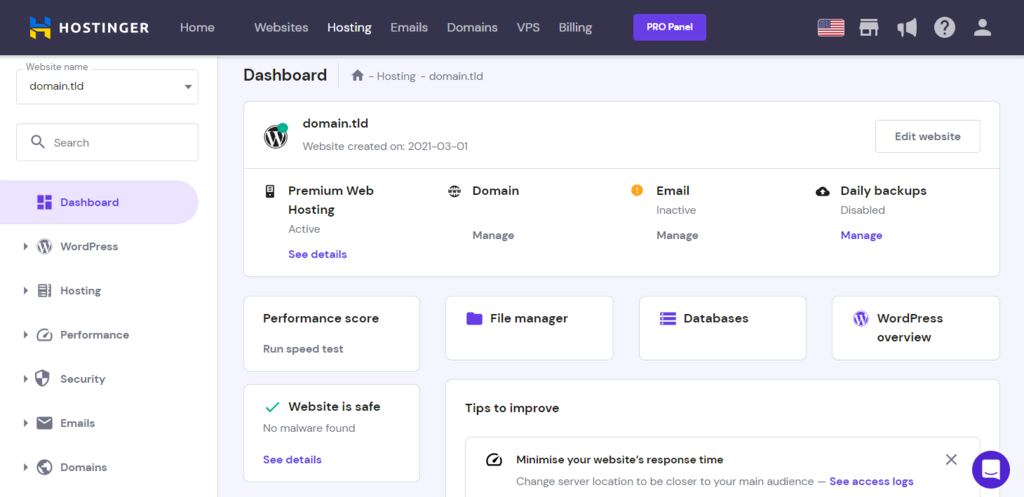
In summary, Hostinger offers a compelling package for individuals and small to mid-scale businesses seeking a budget-friendly yet powerful website builder. Its focus on marketing integration, coupled with user-friendly design tools and reliable performance, makes it a top contender for anyone looking to create a professional online presence.
Squarespace: Where Design Meets Functionality
Squarespace shines as a beacon for those seeking a seamless blend of design and functionality in their quest for the best website builder. Renowned for its visually stunning templates and user-friendly interface. Squarespace caters to a diverse range of users, from bloggers and small business owners to ecommerce enthusiasts. Let’s delve into what sets Squarespace apart:
Design and Templates:
- Professional-Looking Templates: Over 140 sophisticated themes optimized for mobile devices, ensuring your site looks great on any screen.
- Customization: Despite some limitations in design freedom, the templates offer high customizability through the Design menu, allowing you to tailor your site to your exact needs.
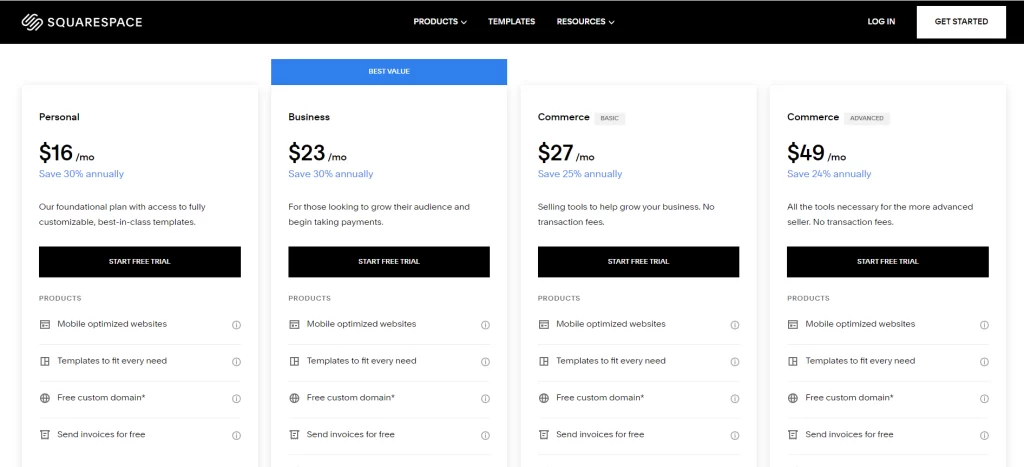
Features and Functionality:
- Ecommerce and Blogging: Strong ecommerce features complemented by a powerful blogging suite, which includes multi-author functionality, post scheduling, AMP support, and podcast hosting.
- Built-In Tools: A comprehensive set of tools including analytics, SEO settings, email marketing, and a free SSL certificate, all aimed at enhancing your site’s performance and reach.
- Support and Resources: 24/7 live chat support, a well-supplied knowledge base, video guides, and an active community forum ensure you have the help you need, when you need it.
Plans and Pricing:
- No Free Plan, But a Free Trial: While there is no free plan, Squarespace offers a 14-day free trial to test its features. Pricing starts at $16/month for the Personal plan, scaling up to $49/month for the Advanced Commerce plan.
- Inclusions Across Plans: All plans come with unlimited bandwidth and storage, and a free custom domain for the first year, ensuring you have the essentials to start and grow your online presence.
Squarespace’s appeal lies in its blend of simplicity and power, offering users a platform that not only looks good but is packed with all the tools needed to build a professional online presence. Whether you’re launching an online store, starting a blog, or simply creating a website to showcase your portfolio. Squarespace provides a solid foundation with its combination of beautiful designs, comprehensive features, and strong support.
Shopify: The E-commerce Powerhouse
Shopify stands as a titan in the e-commerce arena, offering a comprehensive all-in-one platform that caters to the needs of small businesses aiming to carve out their niche online. Its robust architecture is designed to streamline the online selling process, from website creation to managing and scaling operations.
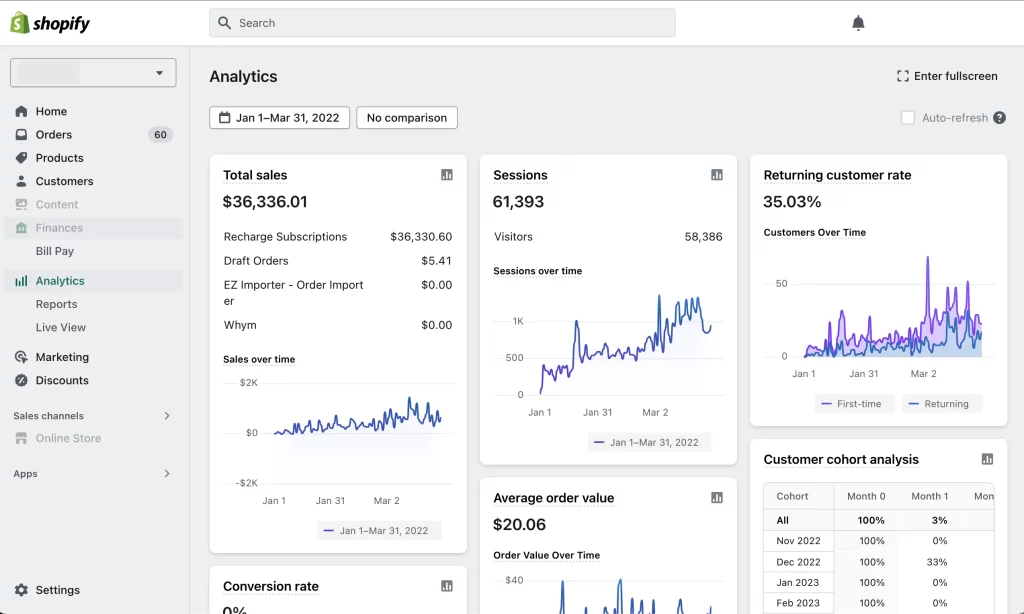
Key Features and Functionalities:
- Customization and Themes: Shopify’s platform allows for deep customization with its back-end editor. Users have access to eight free and 68 paid store themes, all customizable at the code level with Liquid code, offering the flexibility to tailor the online store to specific brand aesthetics.
- Sales Channels and App Store: The platform supports a myriad of sales channels including Facebook, Instagram, eBay, Amazon, and more, ensuring businesses can reach their customers wherever they are. Additionally, Shopify’s App Store is a treasure trove of functionality. Boasting 4,050 free apps and nearly 3,000 paid apps and plugins to extend the capabilities of any store.
- Support and Performance: 24/7 customer support via live chat, email, and social media ensures that help is always at hand. Moreover, all 91 themes are mobile responsive, guaranteeing a seamless shopping experience across devices. Coupled with a 99.98% uptime guarantee and integrated SSL and DDoS protection, Shopify promises reliability and security for both store owners and their customers.
Pricing:
- Basic Shopify: At $39/month, this plan is ideal for new e-commerce ventures. Including basic reporting, shipping discounts, and support for two team members.
- Shopify: For $105/month, businesses gain access to advanced reporting, 5 staff accounts, and an 88% shipping discount, suitable for growing businesses.
- Advanced Shopify: At $399/month, this tier offers a custom report builder, 15 staff accounts, and third-party calculated shipping rates, designed for high-volume merchants.
Pros and Cons:
- Pros:
- High-converting checkout process and extensive app store for added flexibility.
- Strong performance and reliability with features like Shopify Payments and POS for a comprehensive selling experience .
- User-friendly interface with over 200 pre-designed templates, making it accessible for beginners and experienced developers alike.
- Cons:
- Additional transaction fees for using third-party payment gateways.
- While the theme selection is vast, it is relatively limited compared to the total number of apps available.
- Dependence on third-party apps for extended functionality, which can increase operational costs.
Shopify’s platform is not just about creating an online store. it’s about providing a scalable, reliable infrastructure that supports business growth. Whether it’s through its extensive app store, customizable themes, or robust e-commerce features, Shopify empowers businesses to create a professional online presence tailored to their unique needs.
WordPress.com: The Blogger’s Paradise
WordPress.com, often hailed as “The Blogger’s Paradise,” stands out for its simplicity and blogger-friendly features. Making it a go-to platform for those venturing into the blogging world or establishing a professional online presence without the intricacies of web development. Here’s a closer look at what WordPress.com offers:
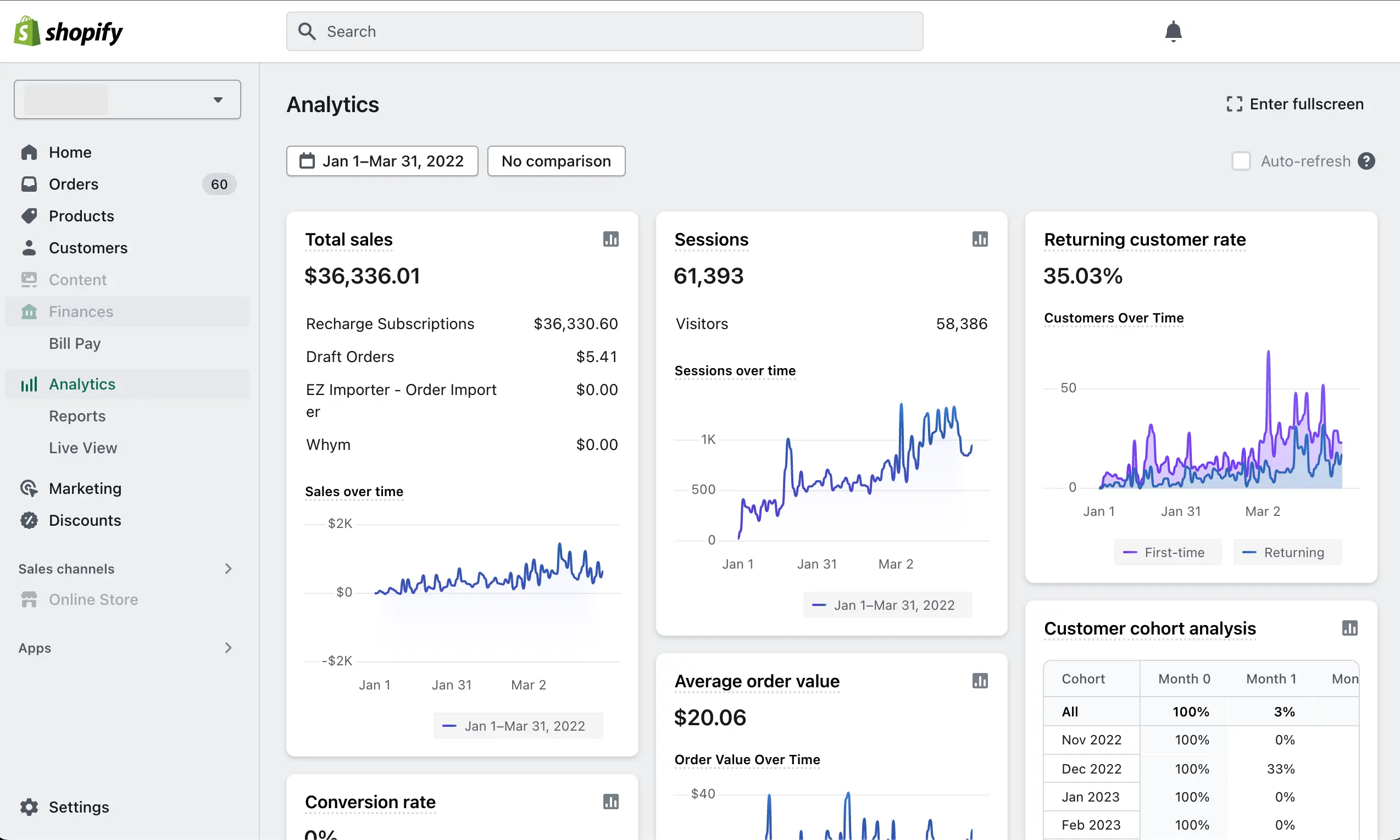
Key Features:
- User-Friendly Experience: Known for its ease of use, WordPress.com allows bloggers to focus on content creation without worrying about technical aspects. Its user-friendly nature is further enhanced by being a hosted platform, eliminating concerns about infrastructure .
- Themes and Customization: With thousands of themes, both free and paid, users have a plethora of design options at their fingertips. This vast selection ensures that every blog can have a unique look and feel, tailored to the blogger’s vision.
- Integration and Support: WordPress.com doesn’t fall short on support and integration capabilities. Social media integration, backup functionalities, and an array of widgets are available to enhance the blog’s functionality. Moreover, customer support is robust, featuring a knowledge base, video tutorials, online courses, and support forums to assist users in every step of their blogging journey.
Available Plans:
- A Range of Options: Catering to various needs and budgets, WordPress.com offers a free plan alongside four premium plans, billed yearly. This flexibility allows bloggers to start without upfront costs and scale up as their blog grows.
- SEO and Premium Features: Advanced SEO tools, crucial for increasing a blog’s visibility and reach, are available with premium plans. This is a critical aspect for bloggers aiming to grow their audience and establish their blog’s presence online.
Pros and Cons:
- Pros:
- Web hosting included, simplifying the setup process.
- The popular freemium plan allows beginners to start with no costs.
- Jetpack Essentials included, offering vital features for site security and performance.
- Mobile responsive themes ensure blogs look great on all devices.
- Cons:
- Limited functionality with the free plan.
- WordPress.com branding on free sites may detract from a professional image.
- Higher-priced plans may be necessary for advanced features, increasing costs.
- Fewer themes available compared to the extensive plugin library of WordPress.org.
In sum, WordPress.com presents a compelling option for bloggers seeking a blend of simplicity, flexibility, and support. Its range of themes and customization options, coupled with a user-friendly platform, make it ideal for individuals and small businesses embarking on their blogging or website creation journey.
Conclusion: Best Website Builders
Throughout this exploration of website builders, we’ve navigated through the nuances and strengths that each platform offers. From the design-centric allure of Squarespace to Shopify’s robust e-commerce capabilities, and not overlooking the versatile appeal of Wix. Each builder comes equipped with unique features designed to cater to different needs. whether you’re launching a blog, creating a professional online presence, or setting up an online store. Their individual attributes underscore the importance of selecting a platform that not only fits your immediate requirements but also contributes to your long-term success.
When making your decision, it’s crucial to weigh factors such as ease of use, design flexibility, and the level of support provided. Remember that the best website builder for you is one that seamlessly aligns with your vision and growth aspirations. With the diverse array of options available, there is a solution out there that perfectly matches your needs. Let this guide serve as your compass in choosing the website builder that fits your needs, propelling you towards achieving your online objectives with confidence and clarity.
FAQs – best website builders
What is the top-ranked website builder currently available? The #1 website builder is Wix, which is highly regarded for its overall performance, ease of use, extensive template selection, and affordability.
Can you list some of the best website builders of 2024? The best website builders of 2024 include:
- Weebly: Best Overall Website Builder
- GoDaddy: Top Choice for Service Providers
- IONOS: Ideal for Startups
- Squarespace: Excellent for Creatives
- HostGator: Great for Simplicity
- Wix: Superior for Code-free Customizations
Which website builder is preferred by professionals?. Professionals often prefer using Wix as their website builder. Due to its comprehensive features, ease of use, and budget-friendly plans starting at $11 per month.
Which website builder is the most popular in the USA?. Squarespace ranks as one of the most popular website builders in the USA. Known for its versatility in creating various types of websites like online stores, blogs, portfolios, small business sites, or membership sites. Although user-friendly, new users might need time to familiarize themselves with the interface.

